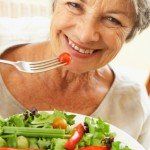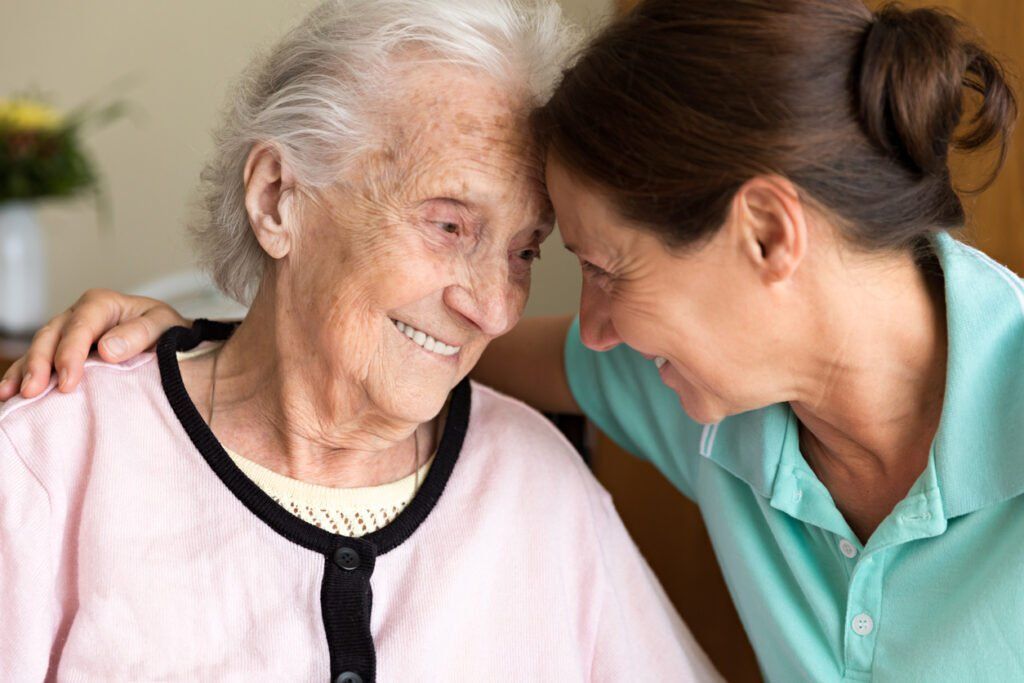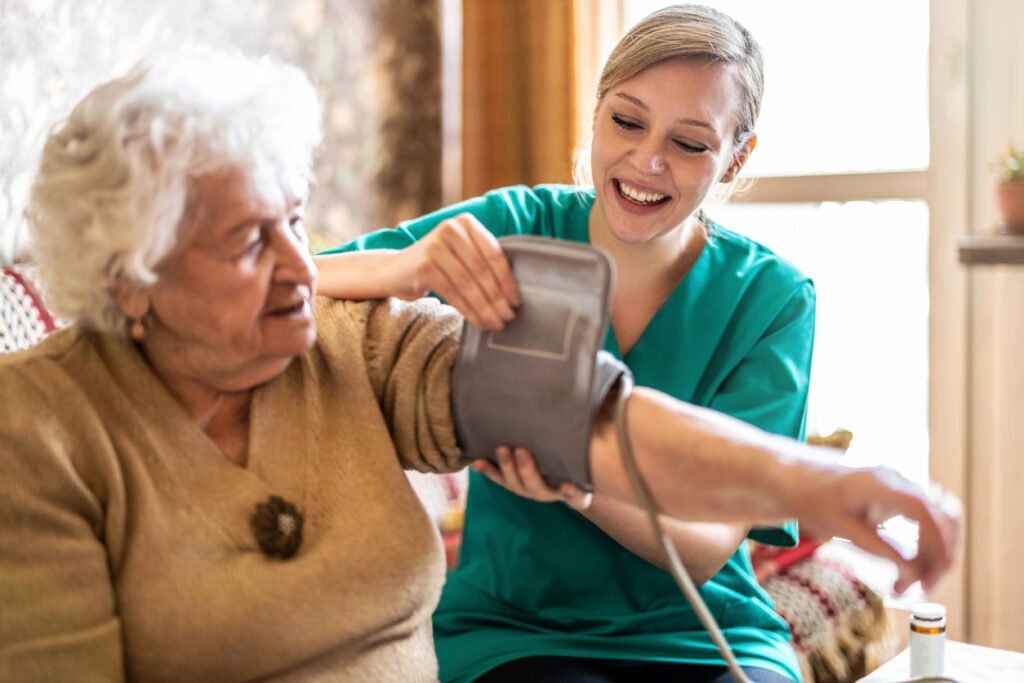Nutrition for Seniors: The top 5 good food choices for those 50 and older!

As we age our dietary needs change—the days of eating junk food, missing lunch or living on fast or processed food needs to be behind those 50 and older. Eating well is essential to good health and the older you get the more important your food choices become. For older adults, the benefits of healthy eating include increased mental acuteness, greater resistance to illness and disease, higher energy levels, recuperation times, and better management of chronic health problems. As we age, eating well can also be the key to a positive outlook and staying emotionally balanced. But healthy eating doesn’t have to be about dieting and sacrifice. Eating well as an older adult is all about fresh, colorful food, creativity in the kitchen, and eating with family and friends.
“You are what you eat” is an old saying but a good one. When you choose a variety of colorful fruits and veggies, whole grains, and lean proteins you’ll feel vibrant and healthy, inside and out.
- Live longer and stronger – Good nutrition keeps muscles, bones, organs, and other body parts strong for the long haul. Eating vitamin-rich food boosts immunity and fights illness-causing toxins. A proper diet reduces the risk of heart disease, stroke, high blood pressure, type-2 diabetes, bone loss, cancer, and anemia. Also, eating sensibly means consuming fewer calories and more nutrient-dense foods, keeping weight in check.
- Sharpen the mind – Key nutrients are essential for the brain to do its job. People who eat a selection of brightly colored fruit, leafy veggies, and fish and nuts packed with omega-3 fatty acids can improve focus and decrease their risk of Alzheimer’s disease.
- Feel better – Wholesome meals give you more energy and help you look better, resulting in a self-esteem boost. It’s all connected—when your body feels good you feel happier inside and out.
Older adults can feel better immediately and stay healthy for the future by choosing healthy foods. A balanced diet and physical activity contribute to a higher quality of life and enhanced independence as you age.
What should be on your grocery list?
Fruits and Vegetables – Look for colorful produce because they are loaded with vitamins and antioxidants. Blueberries, red raspberries and dark cherries are ideal fruits. Dark leafy vegetables like spinach, kale, broccoli or Swiss chard are full of nutrients. Carrots, squash, yams, red, orange and yellow bell peppers are also good choices—either eaten alone or incorporated into a soup, casserole or salad. Try to eat 2 to 2 ½ cups of vegetables every day.
Dairy – This is an incredibly important food group for older adults. Maintaining bone health as you age depends on adequate calcium intake to prevent osteoporosis and bone fractures-you can’t get any other foods with as much calcium as dairy. Dairy is also a good source of vitamin D which is essential for healthy bones. Although dairy products are good for you, stick to low-fat or nonfat milk, yogurt and cheese. Older adults need 1200 mg of calcium daily.
Whole Grains – These powerhouse foods are essential. A good source of B vitamins, they are also loaded with some of the best fiber available—a recent study shows that fiber found in whole grains is better protection against cardiovascular disease, infections and respiratory ailments than fiber from any other source. Be smart with your carbs and choose whole grains over processed white flour for more nutrients and more fiber. Seniors need 6-7 ounces of grains each day (one ounce is about 1 slice of bread).
Meat – If you choose meat, choose wisely. Focus on lean cuts of meat such as chicken and turkey breasts which supply protein and vitamin B-12 without heart-clogging fats. Seniors need about 0.5 grams per pound of bodyweight. Simply divide your bodyweight in half to know how many grams you need. A 130-pound woman will need around 65 grams of protein a day.
Fish – Oily fish such as salmon is an excellent source of omega-3 fatty acids which helps fight the bad cholesterol that tends to build up as we get older. Canned salmon is also a good choice over fresh salmon. If you don’t eat fish at home, order it when you go out to eat—2 servings a week is enough to meet your requirements of this healthy fat.
Other Senior Nutritional Concerns
Water – Our sense of thirst lessens as we age-which makes older adults prone to dehydration. Sipping water throughout the day and with meals is important in helping decrease the chance of urinary tract infections, constipation and even confusion.
Vitamins – After 50, your stomach produces less gastric acid making it difficult to absorb vitamin B-12—needed to help keep blood and nerves vital. Get the recommended daily intake (2.4 mcg) of B12 from fortified foods or a vitamin supplement. We get most of our vitamin D intake through sun exposure and certain foods such as fatty fish, egg yolks and fortified milk. Consult your physician to see if you need to supplement your diet with vitamins.
Tips for eating right
Below are some tips for eating right.
- Reduce sodium (salt) to help prevent water retention and high blood pressure. Look for the “low sodium” label and season meals with garlic, herbs, and spices instead of salt.
- Enjoy good fats. Reap the rewards of olive oil, avocados, salmon, walnuts, flaxseed, and other monounsaturated fats. The fat from these delicious sources can protect your body against heart disease by controlling “bad” LDL cholesterol levels and raising “good” HDL cholesterol levels.
- Add fiber. Avoid constipation, lower the risk of chronic diseases, and feel fuller longer by increasing your fiber intake from foods such as raw fruits and veggies, whole-grains, and beans.
- Avoid “bad” carbs. Bad carbohydrates—also known as simple or unhealthy carbs—are foods such as white flour, refined sugar, and white rice that have been stripped of all bran, fiber, and nutrients. Bad carbs digest quickly and cause spikes in blood sugar levels and short-lived energy. For long-lasting energy and stable insulin levels, choose “good” or complex carbs such as whole grains, beans, fruits, and vegetables.
- Watch for hidden sugar. Added sugar can be hidden in foods such as bread, canned soups and vegetables, pasta sauce, instant mashed potatoes, frozen dinners, fast food, and ketchup. Check food labels for other terms for sugar such as corn syrup, molasses, brown rice syrup, cane juice, fructose, sucrose, dextrose, or maltose. Opt for fresh or frozen vegetables instead of canned goods, and choose low-carb or sugar-free versions of products such as tortillas, bread, pasta, and ice cream.
- Cook smart. The best way to prepare veggies is by steaming or sautéing in olive oil—it preserves nutrients. Forget boiling—it drains nutrients.
Ongoing commitment—sometimes easier said than done
Staying on course, whether it is exercising or eating right is not always as easy as it sounds. Here are some tips to help you maintain your good food choices.
- Ask for help. Depending on your circumstances it might be difficult and to shop, cook, and plan meals. If the tasks seem too much trouble—get help from loved ones, neighbors or a service. It’s important for your health not to revert to frozen dinners or takeout food. Nothing beats a home cooked meal.
- Be innovative! We live in a time when there are cooking shows on 24 hours a day and good recipes are easy to find on the internet. Try eating and cooking something new as often as you can.
- Make it quick and healthy. Cooking healthy meals shouldn’t be a big production. Keep it simple and you’ll stick with it. Stocking the pantry and fridge with wholesome choices will make it easier to prepare quick, tasty meals.
- Break habits. It is easy to eat while watching TV. Although it is easy it can soon become a bad habit. Sit at the table or in nice weather sit outside and eat.
The post Nutrition for Seniors: The top 5 good food choices for those 50 and older! appeared first on Kansas City Home Care.
REQUEST FREE
IN HOME ASSESSMENT
REQUEST FREE IN HOME ASSESSMENT
We will get back to you as soon as possible.
Please try again later.







Kansas City Homecare provides caregiver support services for seniors who need assistance with everyday living and want to live in their home. Our visiting caregivers can provide meals, implement health programs, run small errands and assist with light housekeeping. We are your choice for premium in-home care in the Kansas City area.
We serve Kansas City, Leawood, Mission Hills, Lee's Summit, Overland Park, Lenexa and Olathe.


